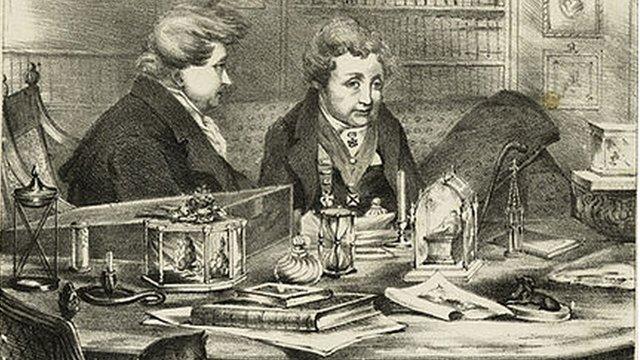Gentleman Jack: The Ladies of Llangollen who intrigued Anne Lister
- Published
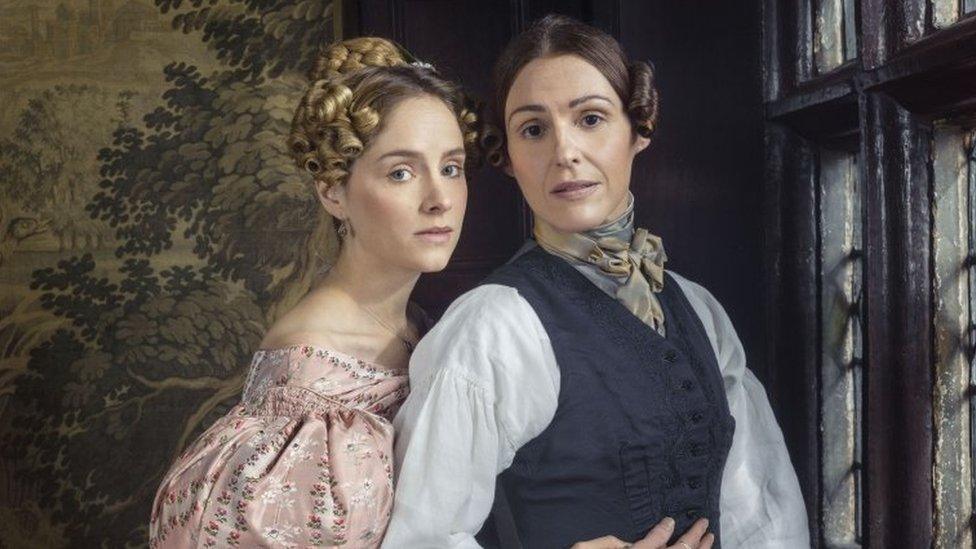
Anne Lister - played by Suranne Jones in the Gentleman Jack series - made a 200-mile round trip from Halifax to Llangollen to visit Sarah Ponsonby and Lady Eleanor Butler
The fascinating life of Anne Lister, the 18th Century industrialist and lesbian, is familiar to many following the BBC series Gentleman Jack.
Fewer people know of the trailblazing same-sex couple living together in north Wales, who she visited after deciding she wanted to marry a woman.
Now the Ladies of Llangollen's "epic love story" has been made into a play.
Writer Katie Elin-Salt hopes Celebrated Virgins, external will get audiences "excited about queer history".

Playwright Katie Elin-Salt has been working on the play for more than two years
Who were the Ladies of Llangollen?
Sarah Ponsonby and Lady Eleanor Butler lived together for 50 happy years at their country house Plas Newydd in Llangollen, Denbighshire.
The public were captivated by their unconventional, romantic way of life and they acquired a celebrity-like status which meant there was a popular demand for prints of them, external.
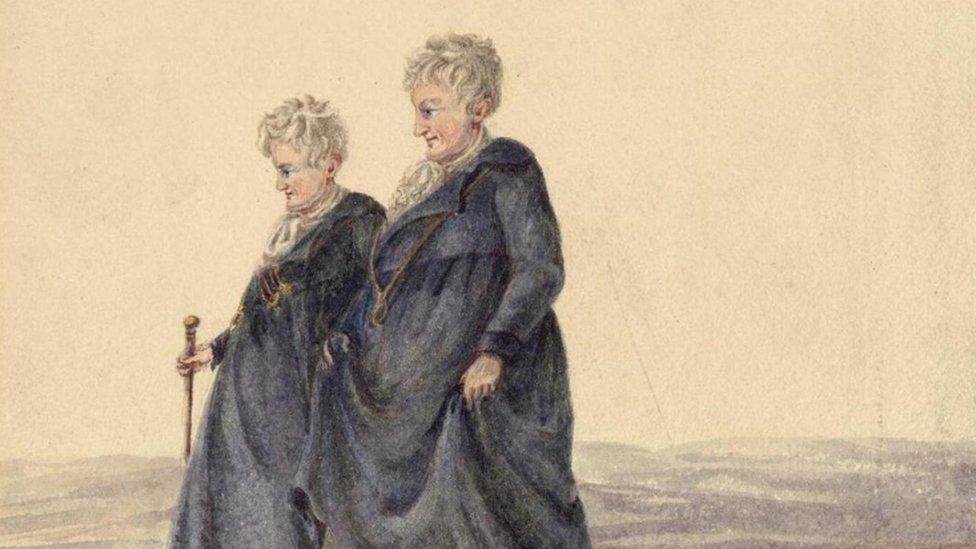
Sarah and Eleanor were "willing to lose everything" to live together, says writer Katie Elin-Salt
"They were very much in love, risked everything and were willing to lose everything just to be together and to live together," explained Elin-Salt, who first began working on the play with director Eleri B Jones more than two years ago.
The aristocratic ladies first met when Sarah (1755-1831) was enrolled at boarding school in Kilkenny, Ireland, when she was just 13 and Lady Eleanor (1739-1829) was 29.
Sarah, an orphan, lived in a mansion in Woodstock, near Kilkenny, under the care of her father's cousin Lady Betty Fownes and her husband Sir William.
Lady Eleanor was the third daughter of Walter Butler of Kilkenny Castle.
She began acting as Sarah's guardian when her relatives were away and the pair formed a strong emotional attachment that would endure for the rest of their lives.
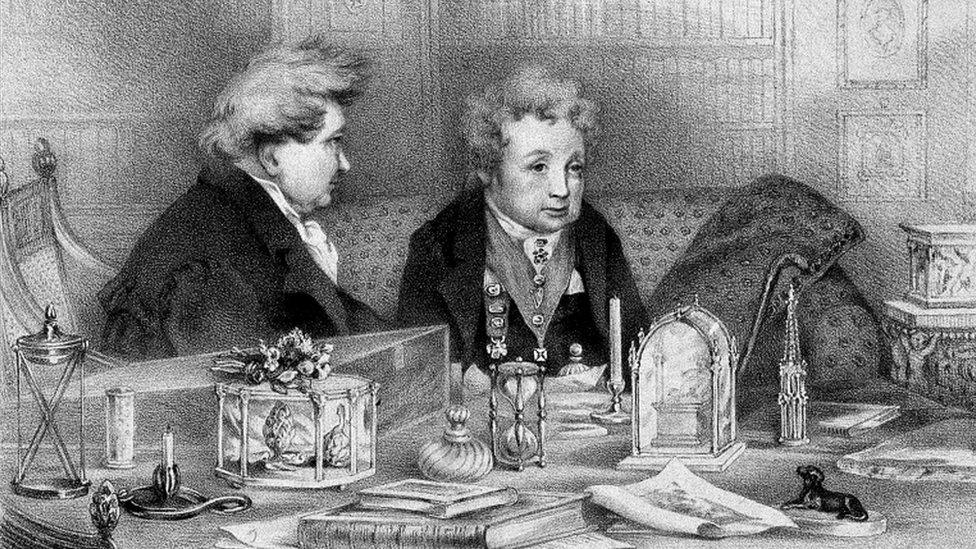
The public were captivated by the ladies' unconventional and romantic way of life
Then in 1778, when Sarah was 23 and Lady Eleanor 39, the two women secretly fled together accompanied by their maidservant Mary Carryl.
"Sarah jumped out of the window with a pistol and a dog under her arm, dressed like a man," said Elin-Salt, 33, from Bridgend.
"It is a brilliant and dangerous escape story."
The trio crossed the Irish Sea, setting up home in Llangollen, delighting locals and famous faces from far and wide, including Anne Lister.
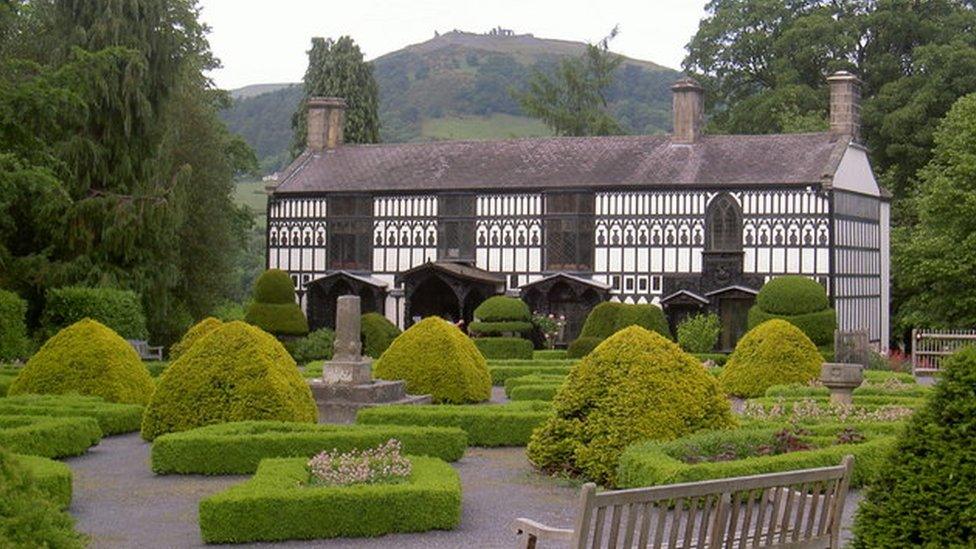
The Ladies of Llangollen lived happily together for 50 years at Plas Newydd
"They just wanted to have this quiet life together in Plas Newydd and disappear into this idyllic utopia to live their lives quietly - then all of this sudden there was this local interest which they found quite bewildering really," said Elin-Salt.
With their unconventional, masculine clothes - black suits and top hats - people began calling them gentlemen.
"They were who they were and they lived in the ways they wanted to," said Elin-Salt.

Eleri B Jones is directing Celebrated Virgins, which will have a run at Theatr Clwyd before moving on to Chapter Arts Centre
Famous visitors
"Anyone of note who was passing through town at that time always paid a visit to the ladies or at least asked to," she said.
"Sometimes they would invite them in and to others they would say 'no, sorry we're busy darning our socks today'."
Notable guests included William Wordsworth and the Duke of Wellington but they missed out on a visit from the then Queen.
"Queen Charlotte did want to visit them but unfortunately they put her off because they started scenting their letters with musk and then they found out, much to their horror, that she was absolutely adverse to the smell and they put her off entirely - they were mortified by that."
'Brazen in her sexuality '
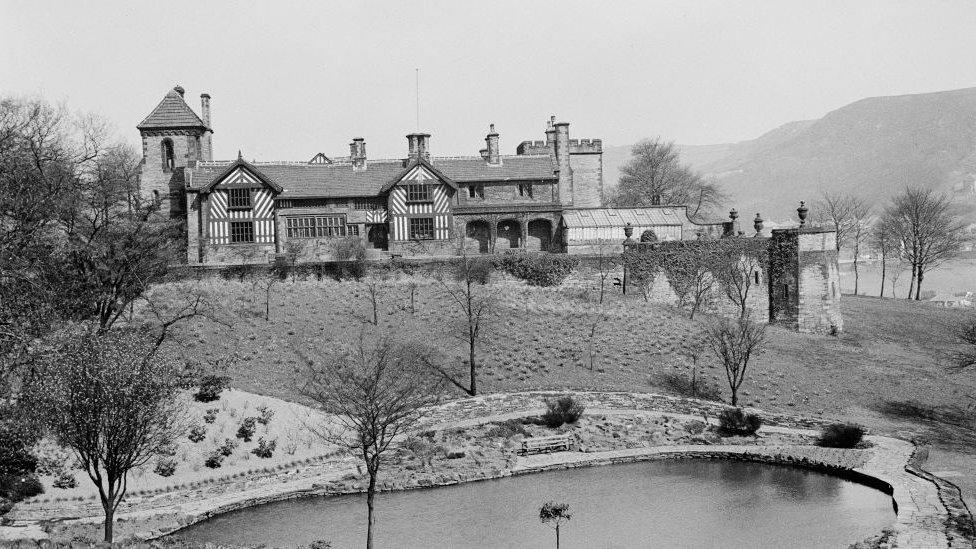
Anne Lister travelled from her home in Shibden Hall, Halifax (pictured) to meet the ladies
But Anne Lister appears to have left a less than favourable impression on the couple, after making a 200-mile round trip from Halifax to see them.
"She did come to visit them but I'm not sure they were huge fans of hers," said Elin-Salt.
"Anne Lister was very bold and very brazen in her sexuality - in as much as she could be at the time - she was a real trailblazer for queer women.
"I don't know whether they found her a little bit confronting - from what we know she visited once and then she was not invited back."

Dr Emily Garside said in the 18th Century people "didn't believe that women were sexual beings"
In the 18th Century homosexual acts were illegal and sexual relationships between women were largely unacknowledged - the word lesbian had not even been coined.
"Mainly because of these patriarchal ideas of woman and sexuality, people didn't believe that women were sexual beings or romantic beings - they were very much still viewed as the commodity of marriage," said Dr Emily Garside, a writer and researcher of LGBTQ+ stories in popular culture.
Actress Suranne Jones portrays Anne as fearless, charismatic and determined to do things her own way.
The series sees her often dressed head to toe in black with a top hat - very similar to the Ladies of Llangollen.
Anne's 'wedding'
Anne may not have won the admiration of the Ladies of Llangollen, but she was certainly a trailblazer.
In 1834 she had a "wedding" to Ann Walker at Holy Trinity church in York.
The event was purely symbolic - attending church with another woman and taking communion was ceremony enough for Anne.
The scandal was soon the talk of Yorkshire.
It was not until the Sexual Offences Act of 1967, external that homosexual acts between two consenting adults over the age of 21 in a private place were permitted.
It would take a number of years for Parliament to fully legalise homosexuality.
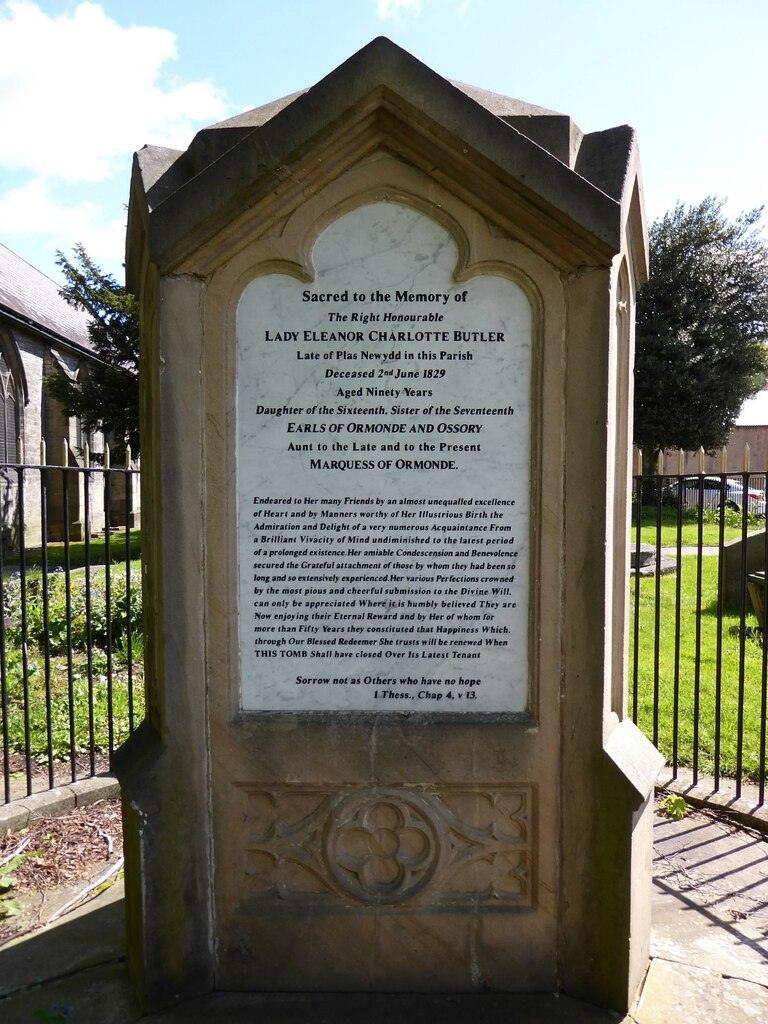
The ladies are buried in St Collen's churchyard in Llangollen alongside their housekeeper

A sexual relationship?
Asked why the play was called Celebrated Virgins, Elin-Salt said it was one of the many monikers given to the ladies at the time, but this title posed interesting questions: "Were they celebrated? Were they virgins?"
When asked if the ladies' relationship was sexual, she said: "To be honest, when we first started doing our research that seemed like the million dollar question, the most interesting thing for us to get to the bottom of.
"But the more that we researched and the more we talked to queer people and went into queer history, we realised that actually putting a label on that relationship isn't the most important thing."
She said what was known for certain was they were "two people very much in love".
"They referred to each other in their diaries as 'my beloved' and 'my love'...
"The ladies I don't think would have defined themselves under any label."
She added: "When we're looking at queer history and queer relationships we get very interested in the intricacies of that and actually, if this was a man and a woman that had run away together and spent their whole lives together I don't think we'd necessarily be asking that question. We'd just accept they were two people who loved each other."
'Hidden histories'
Elin-Salt is hopeful audiences will come away from the play "feeling very excited about queer history".
"The thing is about queer stories, particularly stories of queer women, there are so many of them for us to tell because they haven't been told for so long because they couldn't be."
Dr Garside agrees: "Many of us grew up in a time where you weren't allowed to talk about being LGBTQ in any way, Section 28 meant we had no conversations about history in school or even beyond that...
"There are so many hidden histories that we are uncovering year on year - we need to honour the people who went before us, who didn't have the same freedoms we have today."
She said theatres had "long been a place that supported telling LGBT stories" and it was "wonderful to see Welsh theatres continuing that".
Elin-Salt said for herself and others, it was personal: "As a queer woman in theatre myself in Wales, there are so few stories of women like me, so I'm so excited that we're able to put these women at the front and centre."
Celebrated Virgins will be at Theatr Clwyd in Mold, Flintshire, from 20 May to 4 June and Cardiff's Chapter Arts Centre on 9, 10 and 11 June. The second series of Gentleman Jack starts on 10 April on BBC One.

WOMEN OF WALES: Showcasing amazing Welsh female talent and stories
PEOPLE THOUGHT OF AS BITS OF AN ALGORITHM: Life and death in the warehouse

- Published18 February 2022

- Published9 February 2022

- Published18 February 2022
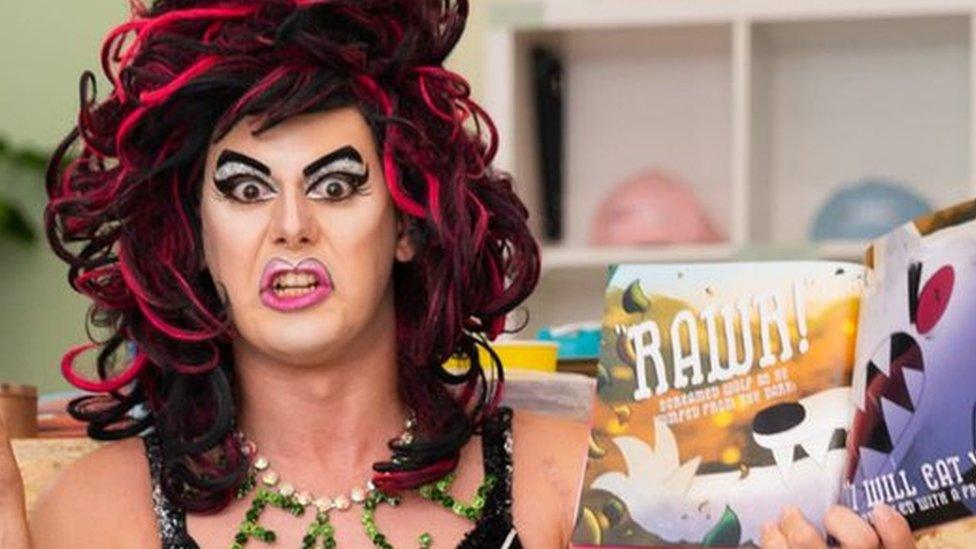
- Published8 May 2013
